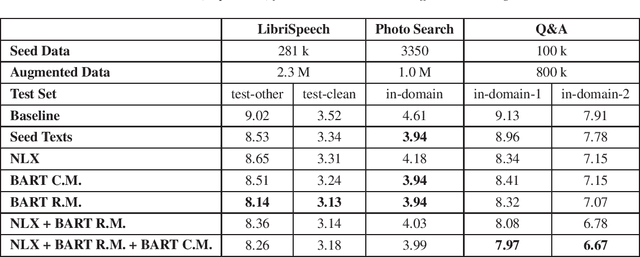Antony D'Avirro
EmphAssess : a Prosodic Benchmark on Assessing Emphasis Transfer in Speech-to-Speech Models
Dec 21, 2023Abstract:We introduce EmphAssess, a prosodic benchmark designed to evaluate the capability of speech-to-speech models to encode and reproduce prosodic emphasis. We apply this to two tasks: speech resynthesis and speech-to-speech translation. In both cases, the benchmark evaluates the ability of the model to encode emphasis in the speech input and accurately reproduce it in the output, potentially across a change of speaker and language. As part of the evaluation pipeline, we introduce EmphaClass, a new model that classifies emphasis at the frame or word level.
EXPRESSO: A Benchmark and Analysis of Discrete Expressive Speech Resynthesis
Aug 10, 2023



Abstract:Recent work has shown that it is possible to resynthesize high-quality speech based, not on text, but on low bitrate discrete units that have been learned in a self-supervised fashion and can therefore capture expressive aspects of speech that are hard to transcribe (prosody, voice styles, non-verbal vocalization). The adoption of these methods is still limited by the fact that most speech synthesis datasets are read, severely limiting spontaneity and expressivity. Here, we introduce Expresso, a high-quality expressive speech dataset for textless speech synthesis that includes both read speech and improvised dialogues rendered in 26 spontaneous expressive styles. We illustrate the challenges and potentials of this dataset with an expressive resynthesis benchmark where the task is to encode the input in low-bitrate units and resynthesize it in a target voice while preserving content and style. We evaluate resynthesis quality with automatic metrics for different self-supervised discrete encoders, and explore tradeoffs between quality, bitrate and invariance to speaker and style. All the dataset, evaluation metrics and baseline models are open source
Text Generation with Speech Synthesis for ASR Data Augmentation
May 22, 2023


Abstract:Aiming at reducing the reliance on expensive human annotations, data synthesis for Automatic Speech Recognition (ASR) has remained an active area of research. While prior work mainly focuses on synthetic speech generation for ASR data augmentation, its combination with text generation methods is considerably less explored. In this work, we explore text augmentation for ASR using large-scale pre-trained neural networks, and systematically compare those to traditional text augmentation methods. The generated synthetic texts are then converted to synthetic speech using a text-to-speech (TTS) system and added to the ASR training data. In experiments conducted on three datasets, we find that neural models achieve 9%-15% relative WER improvement and outperform traditional methods. We conclude that text augmentation, particularly through modern neural approaches, is a viable tool for improving the accuracy of ASR systems.
 Add to Chrome
Add to Chrome Add to Firefox
Add to Firefox Add to Edge
Add to Edge